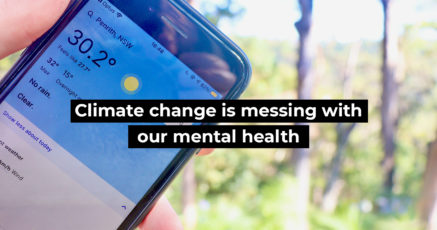Are you reading this stuck in traffic or transport delays with sweat trickling down your neck? Do you keep a puffer close to hand to deal with storm-induced asthma?
Welcome to summer. It’s going to become even worse.
With climate change wreaking havoc, a report from RMIT University surveyed workers across a range of sectors about how they were experiencing the effects of climate change at work.
What the researchers from RMIT University found was that you don’t have to be an outdoor worker to experience the effects of extreme weather.
Whether you work indoors or outside, are junior or senior, your work commute is one way where climate change can cause stress on a daily basis.
One worker described the long commutes her co-workers endure to and from work – a story that will sound familiar to many workers.
“When train services are disrupted by extreme weather it means staff are delayed coming to work or going home. This lengthens their working day and leaves people feeling tired, stressed, and angry before they get to work, or on their way home.”
A care worker was worried about how not being able to access the home of her clients meant they missed out on essential services.
“On really hot days it is impossible to adequately cool some spaces, especially my car… Extreme weather and fire smoke make community access with many clients nearly impossible at times and it feels like the most vulnerable miss out on the most,” she said.
At the workplace
Disruptions to work commutes can also lead to other stresses for workers such as short staffing.
“I have to work additional hours when our severely asthmatic staff can’t make it due to the weather giving them asthma attacks,” one manager said.
And sometimes when workers have successfully made it into work, the extreme weather has still threatened their safety.
“There have been days when it has been too dangerous to do my commute (due to intense rain or extreme heat) and I’ve needed to work from home. But in one rain event the roof collapsed in our office building, and we needed to evacuate,” a worker described.
And with IPCC reports warning us about reaching the ‘catastrophic’ point of climate change impacts, these situations will only become more frequent in the future.
What can be done now
Many workers who participated in the survey wanted to see action at a national level with significant reduction in greenhouse emissions. Thanks to pressure from the union movement, we have already seen the Albanese government take important first steps.
But even at the workplace level, workers identified ways in which we can make sure we are better prepared to tackle climate-related challenges.
According to the workers surveyed, few organisations have a climate change adaptation strategy and only 14 per cent of respondents reported that their organisation has one.
Others stated the need for more flexible work arrangements so people could either work at home to avoid commutes or change their hours to avoid the heat of the day.
If you are already a union member and want help to start a conversation about making changes in your workplace, reach out to your union.
Otherwise, joining your union is the best step towards making sure everyone goes to and from work safe and sound.
Cover photo credit: Nicolas Weldingh on Unsplash







SHARE:
How climate change disrupts your daily commute